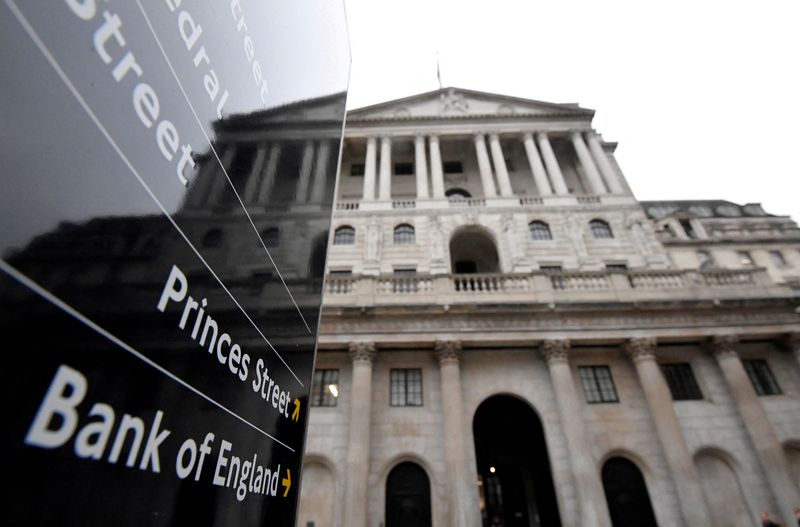By Andy Bruce
LONDON (Reuters) - The surprise split vote behind the Bank of England's interest rate hike last week, which was too small for almost half its officials, threatens to obscure the British central bank's intentions and potentially hurt the economy.
Some BoE watchers say emerging evidence of division among policymakers over how to respond to inflation could sow confusion about its reaction function - the way investors and the public can expect a central bank to respond to economic developments.
The BoE has already been accused of mixed messaging after wrong-footing investors who expected a rate hike in November, then raising borrowing costs in December.
"The on-and-off-again November interest rate hike was only a microcosm of that," said economists Robert Wood and Kamal Sharma from BofA Global Research.
"What we see as changes to reaction function leave us more concerned about the current inflation episode."
With the BoE warning that inflation could soon surpass 7% - almost four times its target - four of the nine Monetary Policy Committee (MPC) members voted on Feb. 2 to raise Bank Rate to 0.75%.
That would have represented the biggest one-off increase in borrowing costs since the BoE became operationally independent 25 years ago.
In the end, a slim majority of five, including Governor Andrew Bailey, voted for a 0.25 percentage point increase to 0.5% - still historically very low.
While the MPC agreed that further modest tightening of monetary policy was likely in the coming months, the difference between the two camps was about more than a few basis points.
Minutes from their meeting showed they had different approaches to bringing inflation back towards the BoE's 2% target.
Policymakers backing a 25 basis point increase worried that a bigger rise might provoke an "outsized" shift in Bank Rate expectations among investors, which already looked steep enough to push inflation well below target in three years' time.
From this group, Chief Economist Huw Pill said on Friday he was keen to avoid the impression the BoE was going "foot to the floor" in a rapid and steep cycle of policy tightening that risked hurting the economy unnecessarily.
The minority of four MPC members who wanted a bigger rate hike thought the BoE should aim to jolt expectations about higher inflation and cut out the risk that price pressures get embedded in pay deals and expectations for future inflation.
The BoE could probably squash inflation by raising Bank Rate a couple more times to 1% in May and running down its nearly 900 billion pound ($1.2 trillion) bond-buying programme, alongside "consistent, forceful communication", Wood and Sharma said.
But they warned that any lack of a clear message risked creating an economic downturn that could possibly have been avoided.
While the U.S. Federal Reserve looks set to raise rates in March, there seems less chance of similar differences emerging among its officials about how to tighten policy.
Even St. Louis Fed President James Bullard, a strident supporter of early and fast policy tightening, told Reuters last week it was not clear what starting off with a bigger, 50 basis point, hike would accomplish.
NO CLEAR MESSAGE?
While the BoE has sometimes faced accusations of groupthink during normal times, in past periods of economic upheaval its policymakers mostly stuck to the same script, helping businesses and households to plan ahead, Wood and Sharma noted.
Its current approach differs from the forward guidance policy of former governor Mark Carney, who tried to issue clear statements about the reaction function - although he too faced criticism that this made the BoE a hostage to fortune.
Most BoE officials did not speak publicly before last week's rates announcement and after the communication missteps of last year Bailey said he could imagine going back to the days of no guidance.
But some economists warn that without a consistent message at a critical juncture for expectations about the economic and policy outlook, the BoE risks losing control of the narrative, with real world consequences.
The market reaction to Thursday's decision may have been a taster of that scenario.
Investors ratcheted up their bets for future interest rate hikes, despite the signal from the BoE's inflation forecasts that it thought the market view of the rates outlook was already aggressive.
If the market goes too far in pricing rate hikes, and for too long, it would tighten financial conditions and hurt the ability of businesses and households to access finance.

"We think markets are currently pricing in too many hikes; something that could persist until the BoE clarifies its approach," said Vivek Paul, UK chief investment strategist at the BlackRock (NYSE:BLK) Investment Institute.
"The MPC will need to communicate clearly what its motivation is, in our view, to avoid over-tightening financial conditions and hurting the real economy."